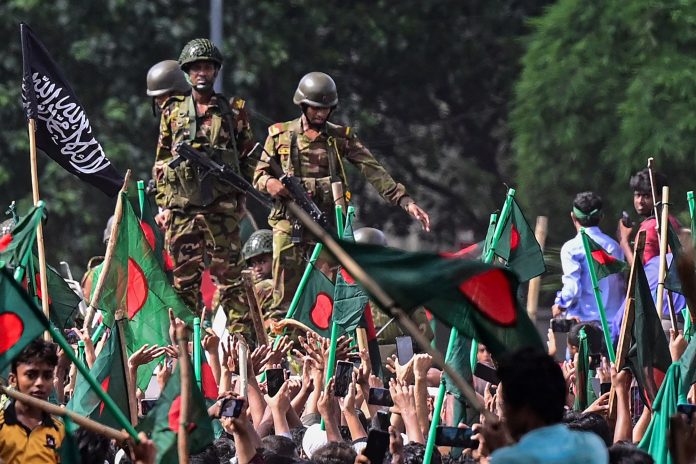Bangladesh Prime Minister Sheikh Hasina left her palace on Monday as crowds of protesters demanding her resignation took to the streets of Dhaka and the army commander was about to address the nation.
Bangladesh’s military chief General Waker-uz-Zaman announced plans to seek the president’s advice on forming an interim government. He promised that the military would resign and launch an investigation into the deadly crackdown that sparked outrage against the government, and asked citizens for time to restore peace. He said:
“Keep faith in the military, we will investigate all the killings and punish the responsible. I have ordered that no army and police will indulge in any kind of firing. Now, the students’ duty is to stay calm and help us.”
The protests began when disgruntled students demanded the abolition of the quota system for government jobs, but the demonstrations have since escalated into an unprecedented challenge and uprising against Hasina and her ruling Awami League party.
The government has attempted to quell the violence by force, leaving some 300 people dead, sparking further outrage and calls for Hasina to step down.
Protesters in Bangladesh storm Prime Minister Sheikh Hasina’s residence.
Hundreds dead, thousands arrested in Bangladesh
At least 95 people, including at least 14 police officers, were killed in clashes in the capital on Sunday, according to Prothom Alo, the country’s leading Bengali-language daily newspaper. Hundreds of people were injured. At least 11,000 people have been arrested in recent weeks. The unrest has led to the closure of schools and universities across the country, and authorities at one point imposed a curfew with the right to shoot to kill.
Over the weekend, protesters called for “non-co-operation”, urging people not to pay taxes and utility bills and not to go to work on Sunday, a working day in Bangladesh. Offices, banks and factories opened, but commuters in Dhaka and other cities struggled to get to their workplaces.
Hasina offered to talk to student leaders on Saturday, but one of the coordinators refused and announced a one-point demand for resignation. Hasina repeated her promises to investigate the deaths and punish those responsible for the violence. She said she was ready to come to the negotiating table when the protesters wanted her to.
Authorities shut down mobile internet on Sunday in an attempt to quell the unrest, and broadband internet was briefly cut off on Monday morning. It was the second internet shutdown in the country after protests turned deadly in July. Broadband and mobile internet resumed on Monday after three hours of suspension.
Hasina said protesters who engage in “sabotage” and destruction were no longer students but criminals and said the nation should deal with them with an iron hand.
Hasina fled to India
The 76-year-old woman was elected to a fourth consecutive term in a January vote that was boycotted by her main opponents, raising questions about how free and fair the vote was. Thousands of opposition members were jailed ahead of the vote, which the government defended as democratic.
Indian media reports that Sheikh Hasina is staying in the Indian city of Agartala. A little earlier, Indian Prime Minister Narendra Modi’s government declared a “high alert” along the border with Bangladesh.
